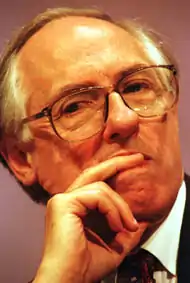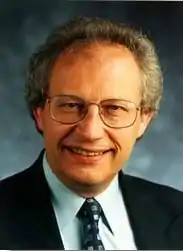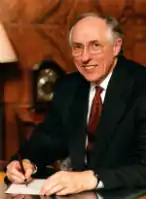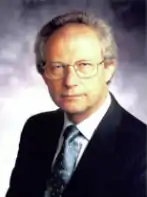Scottish Labour–Liberal Democrat coalition government, 1999–2007
The Scottish Labour Party and the Scottish Liberal Democrats formed the devolved Scottish Executive in coalition between May 1999 and May 2007.
Donald Dewar, Henry McLeish and Jack McConnell held office as First Minister of Scotland respectively throughout the government.
The ministerial role of Deputy First Minister of Scotland was given to the Leader of the Scottish Liberal Democrats with Jim Wallace and Nicol Stephen under taking this office respectively.
The government consisted of four ministries: the Dewar and McLeish ministry and the first and second McConnell ministry.
History
Donald Dewar led Scottish Labour's campaign for the first general election to the Scottish Parliament on 6 May 1999. Labour won the most votes and seats, with 56 seats out of 129, a clear distance ahead of their main opponents the Scottish National Party (SNP). Labour entered government by forming a coalition government with the Scottish Liberal Democrats, with Dewar agreeing to their demand for the abolition of up-front tuition fees for university students as the price for a coalition deal.[1] Dewar became the inaugural First Minister of Scotland on 17 May 1999.[2]
Dewar died only a year later on 11 October 2000. [3] A new first minister was elected in a ballot by Scottish Labour's MSPs and national executive members, because there was insufficient time to hold a full leadership election.[4] On 26 October, Henry McLeish was elected to succeed Dewar, defeating rival Jack McConnell.
Labour's dominance of Scotland's Westminster seats continued in the 2001 general election, with a small loss of votes but no losses of seats.[5]
McLeish resigned later that year amid a scandal involving allegations that he sub-let part of his tax-subsidised Westminster constituency office without it having been registered in the register of interests kept in the Parliamentary office. The press called the affair Officegate. [6]
Though McLeish could not have personally benefited financially from the oversight, he undertook to repay the £36,000 rental income, and resigned to allow the Scottish Labour Party a clean break to prepare for the 2003 elections. After McLeish's resignation, Jack McConnell quickly emerged as the only candidate, and was elected First Minister by the Parliament on 22 November 2001, before being formally sworn into office on 27 November 2001.[7][8]
The coalition between Labour and the Liberal Democrats was narrowly re-elected at the 2003 Scottish general election, with Labour losing 7 seats and the Liberal Democrats gaining 1. The SNP also lost seats, though other pro-independence parties made gains.[9]
Labour once again won the majority of seats in Scotland at the 2005 UK general election.[10] The boundaries in Scotland were redrawn to reduce the number of Westminster constituencies in Scotland from 72 to 59. Labour had a notional loss of 5 seats and an actual loss of 15.
At the start of the campaign for the 2007 Scottish general election, Labour were behind the Scottish National Party (SNP) in most of the opinion polls. On 10 April, McConnell unveiled Scottish Labour's election manifesto, which included plans to scrap (?) bills for pensioners and reform Council Tax. The manifesto also proposed a large increase in public spending on education, which would allow for the school leaving age to be increased to 18 and reduce average class sizes to 19 pupils. Labour lost 4 seats and fell narrowly behind the SNP, who won 47 seats to Labour's 46 seats. Labour still won the most constituencies, but the SNP made inroads on the regional list. Both parties were well short of an overall majority in the parliament.
SNP leader Alex Salmond was elected first minister with support from the Scottish Greens, defeating McConnell 49-46 while the Conservatives and Liberal Democrats abstained.[11] Labour did take the most votes in the local elections on the same day but lost seats due to the introduction of proportional representation for local council elections.
The Executive was dissolved when Salmond was formally sworn into office as First Minister by senior judges at the Court of Session. Parliament approved Salmond’s ministerial appointments and the next government was formed.[12]
Scottish Executive under Donald Dewar
Dewar ministry
| Dewar ministry | |
|---|---|
1st devolved administration of Scotland | |
| 1999–2000 | |
 | |
| Date formed | 17 May 1999 |
| Date dissolved | 11 October 2000 |
| People and organisations | |
| Monarch | Elizabeth II |
| First Minister | Donald Dewar |
| First Minister's history | 1999–2000 |
| Deputy First Minister | Jim Wallace |
| Member parties | |
| Status in legislature | Majority (coalition) 72 / 129 (56%)
|
| Opposition party | Scottish National Party |
| Opposition leader | Alex Salmond (1999-2000) John Swinney (2000) |
| History | |
| Election(s) | 1999 general election |
| Legislature term(s) | 1st Scottish Parliament |
| Successor | McLeish ministry |
Dewar Cabinet[13] | ||||
|---|---|---|---|---|
| Post | Minister | Term | Party | |
| First Minister | The Rt Hon. Donald Dewar MSP | May 1999–Oct. 2000 | Labour Party | |
| Deputy First Minister Minister for Justice |
Jim Wallace QC MSP | Liberal Democrats | ||
| Minister for Children and Education | Sam Galbraith MSP | Labour Party | ||
| Minister for Social Inclusion, Local Government and Housing | Wendy Alexander MSP | |||
| Minister for Enterprise and Lifelong Learning | Henry McLeish MSP | |||
| Minister for Finance | Jack McConnell MSP | |||
| Minister for Health and Community Care | Susan Deacon MSP | |||
| Chief Whip and Government Business Manager | Tom McCabe MSP | |||
| Minister for Rural Affairs | Ross Finnie MSP | Liberal Democrats | ||
| Minister for Transport and the Environment | Sarah Boyack MSP | Labour Party | ||
| Lord Advocate | The Rt Hon. The Lord Hardie PC QC | May 1999–Feb. 2000 | ||
| The Rt Hon. Colin Boyd QC | Feb. 2000–Oct. 2000 | |||
Junior ministers[13] | ||||
|---|---|---|---|---|
| Post | Minister | Term | Party | |
| Deputy Minister for Children and Education | Peter Peacock MSP | May 1999–Oct. 2000 | Labour Party | |
| Deputy Minister for Culture and Sport | Rhona Brankin MSP | |||
| Deputy Minister for Social Inclusion, Equality and the Voluntary Sector | Jackie Baillie MSP | |||
| Deputy Minister for Local Government | Frank McAveety MSP | |||
| Deputy Minister for Enterprise and Lifelong Learning | Nicol Stephen MSP | Liberal Democrats | ||
| Deputy Minister for Highlands and Islands and Gaelic | Alasdair Morrison MSP | Labour Party | ||
| Deputy Minister for Health and Community Care | Iain Gray MSP | |||
| Deputy Minister for Justice (with particular responsibility for Land Reform) | Angus MacKay MSP | |||
| Deputy Business Manager and Liberal Democrat Whip | Iain Smith MSP | Liberal Democrats | ||
| Deputy Minister for Rural Affairs (with particular responsibility for Fisheries) | John Home Robertson MSP | Labour Party | ||
| Solicitor General for Scotland | Colin Boyd QC | May 1999–Feb. 2000 | ||
| Neil Davidson QC | Feb. 2000–Oct. 2000 | |||
Changes
Lord Hardie unexpectedly resigned from his post as Lord Advocate on 17 February 2000. The post was filled by the then Solicitor General, Colin Boyd, who was in turn replaced by Neil Davidson.[14]
Scottish Executive under Henry McLeish
McLeish ministry
| McLeish ministry | |
|---|---|
2nd devolved administration of Scotland | |
| 2000–2001 | |
 | |
| Date formed | 27 October 2000 |
| Date dissolved | 8 November 2001 |
| People and organisations | |
| Monarch | Elizabeth II |
| First Minister | Henry McLeish |
| First Minister's history | 2000–2001 |
| Deputy First Minister | Jim Wallace |
| Member parties | |
| Status in legislature | Majority (coalition) 70 / 129 (54%)
|
| Opposition party | Scottish National Party |
| Opposition leader | John Swinney |
| History | |
| Legislature term(s) | 1st Scottish Parliament |
| Predecessor | Dewar ministry |
| Successor | First McConnell ministry |
Junior ministers[16] | ||||
|---|---|---|---|---|
| Post | Minister | Term | Party | |
| Deputy Minister for Education, Europe and External Affairs | Nicol Stephen MSP | 2000–Nov. 2001 | Liberal Democrats | |
| Deputy Minister for Social Justice | Margaret Curran MSP | 2000–Nov. 2001 | Labour Party | |
| Deputy Minister for Enterprise & Lifelong Learning and Gaelic | Alasdair Morrison MSP | 2000–Nov. 2001 | Labour Party | |
| Deputy Minister for Highlands and Islands and Gaelic | Alasdair Morrison MSP | 2000–Nov. 2001 | Labour Party | |
| Deputy Minister for Culture and Sport (Sport, the Arts and Culture from March 2001) |
Allan Wilson MSP | 2000–Nov. 2001 | Labour Party | |
| Deputy Minister for Finance and Local Government | Peter Peacock MSP | 2000–Nov. 2001 | Labour Party | |
| Deputy Minister for Health and Community Care | Malcolm Chisholm MSP | 2000–Nov. 2001 | Labour Party | |
| Deputy Minister for Justice | Iain Gray MSP | 2000–Nov. 2001 | Labour Party | |
| Deputy Minister for Parliament | Tavish Scott MSP | 2000–Mar. 2001 | Liberal Democrat | |
| Euan Robson MSP | Mar.–Nov. 2001 | Liberal Democrats | ||
| Deputy Minister for Rural Development (Environment and Rural Development from March 2001) |
Rhona Brankin MSP | 2000–Nov. 2001 | Labour Party | |
| Deputy Minister for Transport and Planning | Lewis Macdonald MSP | Mar.–Nov. 2001 | Labour Party | |
| Solicitor General for Scotland | Neil Davidson QC | 2000–Nov. 2001 | Labour Party | |
Changes
Tavish Scott resigned from his post of Deputy Minister for Parliament on 9 March 2001.[17][18] He was replaced by Euan Robson.[19]
Sam Galbraith resigned from his post of Minister for Environment, Sport and Culture on 20 March 2001.[20] Following his resignation, the environment portfolio was combined with that of rural development, planning was added to the transport portfolio, and the sport and culture portfolio was given Deputy Minister Allan Wilson without a promotion to minister. In addition, a new post of Deputy Minister for Transport and Planning in line with the expanded transport portfolio. This post was filled by Lewis Macdonald.[21][22]
Scottish Executive under Jack McConnell
First McConnell ministry
| First McConnell ministry | |
|---|---|
3rd devolved administration of Scotland | |
| 2001–2003 | |
 | |
| Date formed | 27 November 2001 |
| Date dissolved | 20 May 2003 |
| People and organisations | |
| Monarch | Elizabeth II |
| First Minister | Jack McConnell |
| First Minister's history | 2001–2007 |
| Deputy First Minister | Jim Wallace |
| Member parties | |
| Status in legislature | Majority (coalition) 70 / 129 (54%)
|
| Opposition party | Scottish National Party |
| Opposition leader | John Swinney |
| History | |
| Outgoing election | 2003 general election |
| Legislature term(s) | 1st Scottish Parliament |
| Predecessor | McLeish ministry |
| Successor | Second McConnell ministry |
First McConnell Cabinet[23] | ||||
|---|---|---|---|---|
| Post | Minister | Term | Party | |
| First Minister | The Rt Hon. Jack McConnell MSP | 2001–2003 | Labour Party | |
| Deputy First Minister Minister for Justice |
The Rt Hon. Jim Wallace QC MSP | 2001–2003 | Liberal Democrats | |
| Minister for Education and Young People | Cathy Jamieson MSP | 2001–2003 | Labour Party | |
| Minister for Social Justice | Iain Gray MSP | 2001–2002 | Labour Party | |
| Margaret Curran MSP | 2002–2003 | Labour Party | ||
| Minister for Enterprise, Transport and Lifelong Learning | Wendy Alexander MSP | 2001–2002 | Labour Party | |
| Iain Gray MSP | 2002–2003 | Labour Party | ||
| Minister for Culture and Sport | Mike Watson MSP | 2001–2003 | Labour Party | |
| Minister for Finance and Public Services | Andy Kerr MSP | 2001–2003 | Labour Party | |
| Minister for Health and Community Care | Malcolm Chisholm MSP | 2001–2003 | Labour Party | |
| Minister for Parliament | Patricia Ferguson MSP | 2001–2003 | Labour Party | |
| Minister for the Environment and Rural Development | Ross Finnie MSP | 2001–2003 | Liberal Democrats | |
| Lord Advocate | The Rt Hon. Colin Boyd QC | 2001–2003 | Labour Party | |
Changes
Wendy Alexander resigned for her post of Enterprise Minister on 4 May 2002. Her vacancy was filled by Iain Gray, and his post as Social Justice Minister was in turn filled by Margaret Curran, who had been his deputy.[24] Hugh Henry left the post of Deputy Minister for Health and Community Care on 9 May 2002, and took up the post of Deputy Minister for Social Justice.[25][26] Frank McAveety filled his vacancy.[25] Richard Simpson resigned from his post as Deputy Justice Minister on 26 November 2002, and was replaced by Hugh Henry.[27] Des McNulty filled Henry's vacancy as Deputy Health Minister.[28]
Second McConnell ministry
| Second McConnell ministry | |
|---|---|
4th devolved administration of Scotland | |
| 2003–2007 | |
 | |
| Date formed | 20 May 2003 |
| Date dissolved | 17 May 2007 |
| People and organisations | |
| Monarch | Elizabeth II |
| First Minister | Jack McConnell |
| First Minister's history | 2001–2007 |
| Deputy First Minister | Jim Wallace (1999-2005) Nicol Stephen (2005-2007) |
| Member parties | |
| Status in legislature | Majority (coalition) 67 / 129 (52%)
|
| Opposition party | Scottish National Party |
| Opposition leader | John Swinney (2003-04) Nicola Sturgeon (2004-07) |
| History | |
| Election(s) | 2003 general election |
| Outgoing election | 2007 general election |
| Legislature term(s) | 2nd Scottish Parliament |
| Predecessor | First McConnell ministry |
| Successor | First Salmond ministry |
References
- Scottish coalition deal unveiled
- Dewar appointed as first minister
- 'Father of nation' dies
- Dewar's successor to seek more power for parliament, The Guardian, 23 October 2000.
- McLeish steps down
- McConnell elected first minister
- Scotland's new first minister sworn in
- Scottish Labour retains power - just
- New Scotland political make up Constituency list
- Salmond elected as first minister
- Salmond sworn in as first minister
- "Ministers, Law Officers and Ministerial Parliamentary Aides by Cabinet: Session 1" (PDF). Scottish Parliament. 30 March 2007. Retrieved 7 January 2017.
- "Swift response over Hardie resignation". BBC News. 17 February 2000. Retrieved 18 January 2016.
- "Ministers, Law Officers and Ministerial Parliamentary Aides by Cabinet: Session 1" (PDF). Scottish Parliament. 30 March 2007. Retrieved 7 January 2017.
- "Scottish Ministers". www.scottish.parliament.uk. Scottish Parliament. Archived from the original on 18 April 2001. Retrieved 20 January 2016.
- "Fish row claims first casualty". BBC News. 10 March 2001. Retrieved 20 January 2016.
- "Tavish Scott". scottish.parliament.uk. Scottish Parliament. Retrieved 20 January 2016.
- "Euan Robson". scottish.parliament.uk. Scottish Parliament. Retrieved 20 January 2016.
- "'Outgoing' minister puts health first". BBC News. 20 March 2001. Retrieved 20 January 2016.
- "Environment job is abolished as Galbraith quits". The Daily Telegraph. 21 March 2001. Retrieved 20 January 2016.
- "Lewis Macdonald". scottish.parliament.uk. Scottish Parliament. Retrieved 20 January 2016.
- "Ministers, Law Officer and Ministerial Parliamentary Aides by Cabinet: Session 1" (PDF). www.parliament.scot. Scottish Parliament. 30 March 2007. Retrieved 9 April 2017.
- Gerry Hassan and Eric Shaw (2012). The Strange Death of Labour Scotland. Edinburgh University Press. p. 111. ISBN 978-0748640010.
- Stephen Khan (5 May 2002). "Reshuffle is condemned as 'trawling for talent'". The Guardian. Retrieved 20 January 2016.
- "Hugh Henry". scottish.parliament.uk. Scottish Parliament. Retrieved 20 January 2016.
- "Minister quits over fire 'fascists' row". BBC News. 26 November 2002. Retrieved 20 January 2016.
- "Des McNulty". scottish.parliament.uk. Scottish Parliament. Retrieved 20 January 2016.
- "Ministers, Law Officers and Ministerial Parliamentary Aides, by Cabinet: Session 2" (PDF). Scottish Parliament. 18 June 2008. Retrieved 4 August 2016.


